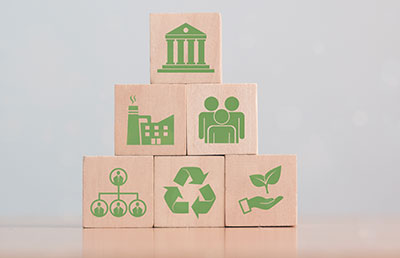What Companies Can Learn from the Life Sciences and Health Care Industry about ESG Reporting
By Peter Micca, CPA, National Health Tech Leader, Deloitte & Touche LLP –
September 4, 2024

Among the more significant challenges facing company compliance departments today is the ever-growing set of Environmental, Social and Governance (ESG) reporting requirements – particularly as it relates to greenhouse gas (GHG) emissions. From California to the European Union, to the Securities and Exchange Commission, legislators and regulators are raising the bar on emissions reporting, and organizations that fall under one or more of these jurisdictions – which amounts to thousands of organizations, including many in New Jersey – need to update their processes, if they haven’t already.
But for many, obtaining comprehensive, accurate data is a significant challenge. Organizations may have better access to their Scope 1 and 2 data, which includes emissions generated directly through their operations, but they often struggle to understand Scope 3 emissions generated throughout the value chain, from suppliers to customers. We know that comprehensive, holistic data is important for charting ESG goals and progress – without strong data, sustainability becomes more difficult to achieve.
One industry is ahead of others in leveraging ecosystem data, and potentially has lessons to impart. Based on Deloitte’s 2024 Sustainability Action Report , life sciences and healthcare (LSHC) companies are generally more confident in the quality of their third-party data, which is enabling them to analyze, report on, and act upon ESG data. The industry cut of the report shows that a third of LSHC companies say they have made “significant progress” toward their ESG goals, compared to 25% of other industries.
Part of this is because LSHC companies have, on average, done more to develop their data ecosystems, and, as a result, have more accurate accounting. According to the survey, 64% of companies across industries say they lack confidence in their vendors’ GHG data, but less than half (49%) of LSHC companies say so. Another reason is the inherently collaborative nature of the LSHC industry. These organizations tend to operate in intricate networks, making information sharing a common practice.
While reporting will be different for every industry, here are some lessons companies can learn from the LSHC industry playbook.
- Make sure your data is accurate – and share it with your partners: Implement robust data collection processes and verification methods about your own emissions, and be prepared to share your data with the partners in your value chain.
- Collaborate with your suppliers: Ensure your suppliers understand the importance of accurate emissions reporting, and work with them to collect and improve data quality.
- Adopt new technologies: Various technologies – like data analytics, artificial intelligence, and blockchain – can make it easier to track and verify complex data across value chains, automate data collection, enhance transparency, and reduce the risk of errors.
- Standardize your reporting: LSHC companies’ standard frameworks, such as those for the Greenhouse Gas Protocol, can serve as a model for other companies to implement consistent and comparable emissions reporting.
- Continuously improve your compliance process: Fostering a culture that constantly enhances your processes, offers regular training for relevant teams, and stays up-to-date with the latest regulatory changes and best practices can improve the accuracy of your GHG reporting efforts.
Note that ESG reporting is becoming increasingly more than just a regulatory necessity. Aside from potential legal penalties, the public, lawmakers, and other stakeholders increasingly expect companies to be transparent about their emissions. Organizations that fail to do so, or fail to do so adequately, run the risk of losing customer loyalty and investor confidence. Given what’s at stake, organizations should stay well-informed of climate disclosures and in compliance with regulatory requirements.
ESG reporting is still new territory for many organizations, and every industry will likely require a different approach. By adopting these lessons from the life sciences industry, organizations can improve the accuracy of their emissions reporting and become more transparent about their GHG emissions.
This publication contains general information only and Deloitte is not, by means of this publication, rendering accounting, business, financial, investment, legal, tax, or other professional advice or services. This publication is not a substitute for such professional advice or services, nor should it be used as a basis for any decision or action that may affect your business. Before making any decision or taking any action that may affect your business, you should consult a qualified professional advisor. Deloitte shall not be responsible for any loss sustained by any person who relies on this publication.
About Deloitte
Deloitte refers to one or more of Deloitte Touche Tohmatsu Limited, a UK private company limited by guarantee (“DTTL”), its network of member firms, and their related entities. DTTL and each of its member firms are legally separate and independent entities. DTTL (also referred to as “Deloitte Global”) does not provide services to clients. In the United States, Deloitte refers to one or more of the US member firms of DTTL, their related entities that operate using the “Deloitte” name in the United States and their respective affiliates. Certain services may not be available to attest clients under the rules and regulations of public accounting. Please see www.deloitte.com/about to learn more about our global network of member firms.
Peter MiccaPeter Micca, CPA, is a senior partner at Deloitte & Touche LLP, serving a broad array of clients in all sectors of the health care, technology, consumer and life sciences industries. He is a member of the NJCPA. |